By: The Editors – nationalreview.com – May 7, 2019
Having thus far failed to break through in the Democratic primary, Senator Cory Booker of New Jersey is seeking to gain an edge in the contest by advancing the most extreme package of gun-control proposals to be touted by any presidential aspirant in two decades. In addition to the usual laundry list — “universal” background checks, a ban on so-called “assault weapons,” the prohibition of standard-capacity magazines — Booker hopes to establish not only a federal registry of guns, but a federal registry of gun owners, too. Under the terms of Booker’s plan, Americans wishing to exercise their Second Amendment rights would have to apply to Washington for permission — not just once, but every five years — and to inform the executive branch of each weapon they own in their home. Exit, Spartacus; enter, Big Brother. As Orwell might have said: He who controls the records, controls the people.
As anyone who has watched the Venezuelan government’s recent confiscation drive can attest, registries of guns and of the people who own them are dangerous and illiberal per se, which is one reason that they remain illegal under federal law. It should be spectacularly obvious that a registry of firearms and their owners is, in effect, a giant map that can be used by its keeper to locate who is armed and how, and, thus, to make their disarmament possible. If that sounds alarmist, look no further than to Senator Booker himself, who continues to argue that the government should use the “terror watch list” — that is, the sprawling, error-ridden list of mostly innocent people that the federal government keeps in secret — to disarm “suspicious” Americans who have been accused, charged, or convicted of no crimes whatsoever. Edmund Burke once wrote that Americans were unique among the people of the world in that they did not wait for an “actual grievance” but instead “augur misgovernment at a distance; and snuff the approach of tyranny in every tainted breeze.” Once again, that tainted breeze has arrived.
Regardless, it remains the case that guns-and-people registries are useless on their own terms, which is why they have been abandoned in failure almost everywhere they have been tried. Perhaps the best example of such failure comes from Canada, which founded a long-gun registry to great fanfare in 2003 and . . . abolished it just nine years later after it had cost over one thousandtimes more than was projected and had failed to help solve a single crime. In Canada, in New Zealand, and at various levels within the United States, gun registries have routinely been exposed as expensive, pointless, and, because they divert resources from anti-crime measures that actually work, counterproductive. Nothing about Senator Booker’s plan gives us confidence that it would end differently.
Indeed, the challenges in the United States are far greater than the challenges elsewhere. There are at present around half a billion privately owned guns in America — that’s billion with a B — and, as recent experiments in Connecticut, New York, and California have shown, Americans seem steadfastly opposed to registration — even when they are threatened with punishment for non-compliance. And that’s among the law-abiding. In a 1968 Fifth Amendment case, Haynes v. United States, the Supreme Court held 7-1 that convicted felons cannot not be punished for failing to register their illegally owned firearms on the grounds that such punishment would constitute self-incrimination. What, one has to ask, is to be the purpose of a registry that is legally permitted to ensnare only the virtuous?
As political shorthand, advocates of federal licensing systems often compare their project to vehicle licensing. Substantively, this is a poor analogy. The primary risk associated with cars is the incompetence of their users, and not, as is the case with firearms, their use in suicides or crimes; car ownership is not an enumerated constitutional right, and, unlike with firearms, there is no history of oppressed Americans being systematically denied licenses as a means of keeping them off the road; and, perhaps most important, as is the case with our present firearms-registration-and-licensing regime, vehicle registration and licensing is performed at the state, not the federal, level, and applies predominantly to those who drive in public. The problems surrounding firearms are unique and specific, and they require unique and specific responses. “Build me a database” simply won’t cut it.
To see this article, click read more.
Source: Cory Booker’s Gun-Control Plan Is Dangerous | National Review
 Listen Online
Listen Online Watch Online
Watch Online Find a Station in Your Area
Find a Station in Your Area









 Listen Now
Listen Now Watch Online
Watch Online
